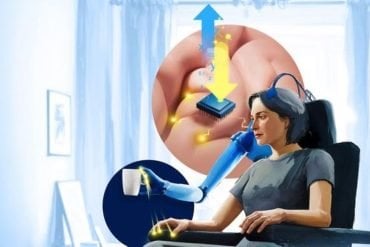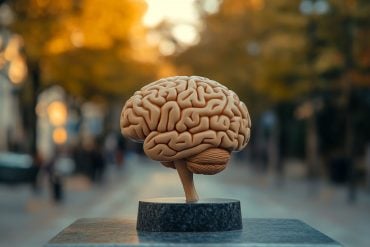Summary: The Tsimane, an indigenous people from the Bolivian Amazon, have less brain atrophy than American aging adults, a new study reports. Additionally, the decrease in their brain volume associated with aging is 70% less than seen in older American adults.
Source: USC
A team of international researchers has found that the Tsimane indigenous people of the Bolivian Amazon experience less brain atrophy than their American and European peers. The decrease in their brain volumes with age is 70% slower than in Western populations. Accelerated brain volume loss can be a sign of dementia.
The study was published May 26, 2021 in the Journal of Gerontology, Series A: Biological Sciences and Medical Sciences.
Although people in industrialized nations have access to modern medical care, they are more sedentary and eat a diet high in saturated fats. In contrast, the Tsimane have little or no access to health care but are extremely physically active and consume a high-fiber diet that includes vegetables, fish and lean meat.
“The Tsimane have provided us with an amazing natural experiment on the potentially detrimental effects of modern lifestyles on our health,” said study author Andrei Irimia, an assistant professor of gerontology, neuroscience and biomedical engineering at the USC Leonard Davis School of Gerontology and the USC Viterbi School of Engineering.
“These findings suggest that brain atrophy may be slowed substantially by the same lifestyle factors associated with very low risk of heart disease.”
The researchers enrolled 746 Tsimane adults, ages 40 to 94, in their study. To acquire brain scans, they provided transportation for the participants from their remote villages to Trinidad, Bolivia, the closest town with CT scanning equipment. That journey could last as long as two full days with travel by river and road.
The team used the scans to calculate brain volumes and then examined their association with age for Tsimane. Next, they compared these results to those in three industrialized populations in the U.S. and Europe.
The scientists found that the difference in brain volumes between middle age and old age is 70% smaller in Tsimane than in Western populations. This suggests that the Tsimane’s brains likely experience far less brain atrophy than Westerners as they age; atrophy is correlated with risk of cognitive impairment, functional decline and dementia.
The researchers note that the Tsimane have high levels of inflammation, which is typically associated with brain atrophy in Westerners. But their study suggests that high inflammation does not have a pronounced effect upon Tsimane brains.
According to the study authors, the Tsimane’s low cardiovascular risks may outweigh their infection-driven inflammatory risk, raising new questions about the causes of dementia.

One possible reason is that, in Westerners, inflammation is associated with obesity and metabolic causes whereas, in the Tsimane, it is driven by respiratory, gastrointestinal, and parasitic infections. Infectious diseases are the most prominent cause of death among the Tsimane.
“Our sedentary lifestyle and diet rich in sugars and fats may be accelerating the loss of brain tissue with age and making us more vulnerable to diseases such as Alzheimer’s,” said study author Hillard Kaplan, a professor of health economics and anthropology at Chapman University who has studied the Tsimane for nearly two decades. “The Tsimane can serve as a baseline for healthy brain aging.”
Healthier hearts and — new research shows — healthier brains
The indigenous Tsimane people captured scientists’ — and the world’s — attention when an earlier study found them to have extraordinarily healthy hearts in older age. That prior study, published by the Lancet in 2017, showed that Tsimane have the lowest prevalence of coronary atherosclerosis of any population known to science and that they have few cardiovascular disease risk factors.
The very low rate of heart disease among the roughly 16,000 Tsimane is very likely related to their pre-industrial subsistence lifestyle of hunting, gathering, fishing, and farming.
“This study demonstrates that the Tsimane stand out not only in terms of heart health, but brain health as well,” Kaplan said. “The findings suggest ample opportunities for interventions to improve brain health, even in populations with high levels of inflammation.”
In addition to Irimia and Kaplan, study authors include Nikhil N. Chaudhari, David J. Robles, Kenneth A. Rostowsky, Alexander S. Maher, Nahian F. Chowdhury, Maria Calvillo, Van Ngo, Margaret Gatz, Wendy J. Mack and Caleb E. Finch (USC), E. Meng Law (Monash University), M. Linda Sutherland, James D. Sutherland and Gregory S. Thomas (MemorialCare Heart and Vascular Institute), Christopher J. Rowan (University of Nevada, Reno), L. Samuel Wann (Ascension Healthcare), Adel H. Allam (Al-Alzhar University, Egypt), Randall C. Thompson (St. Luke’s Mid America Heart Institute), David E. Michalik (University of California, Irvine), Daniel K. Cummings and Edmond Seabright and Paul L. Hooper (University of New Mexico), Sarah Alami and Michael D. Gurven (University of California, Santa Barbara), Angela R. Garcia and Benjamin C. Trumble (Arizona State University, Tempe) and Jonathan Stieglitz (Institute for Advanced Study, Toulouse, France).
Funding: Research funding was provided by the National Institute on Aging at the National Institutes of Health (grant RF1 AG 054442) and the Institute for Advanced Study in Toulouse and the French National Research Agency under the Investments for the Future (Investissements d’Avenir) program (grant ANR-17-EURE-0010).
About this brain aging research news
Source: USC
Contact: Jenesse Miller – USC
Image: The image is credited to Chapman University
Original Research: Closed access.
“The indigenous South American Tsimane exhibit relatively modest decrease in brain volume with age despite high systemic inflammation” by Andrei Irimia et al. Journal of Gerontology: Biological Sciences
Abstract
The indigenous South American Tsimane exhibit relatively modest decrease in brain volume with age despite high systemic inflammation
Brain atrophy is correlated with risk of cognitive impairment, functional decline, and dementia. Despite a high infectious disease burden, Tsimane forager-horticulturists of Bolivia have the lowest prevalence of coronary atherosclerosis of any studied population and present few cardiovascular disease (CVD) risk factors despite a high burden of infections and therefore inflammation.
This study (A) examines the statistical association between brain volume and age for Tsimane, and (B) compares this association to that of three industrialized populations in the U.S. and Europe. This cohort-based panel study enrolled 746 participants aged 40 to 94 (396 males), from whom computed tomography (CT) head scans were acquired.
Brain volume (BV) and intracranial volume (ICV) were calculated from automatic head CT segmentations.
The linear regression coefficient estimate β⌢β⌢T of the Tsimane (T), describing the relationship between age (predictor) and BV (response, as a percentage of ICV), was calculated for the pooled sample (including both sexes) and for each sex. β⌢β⌢T was compared to the corresponding regression coefficient estimate β⌢β⌢R of samples from the industrialized reference (R) countries.
For all comparisons, the null hypothesis βT = βR was rejected both for the combined samples of males and females, as well as separately for each sex. Our results indicate that the Tsimane exhibit a significantly slower decrease in brain volume with age than populations in the U.S. and Europe.
Such reduced rates of brain volume decrease, together with a subsistence lifestyle and low cardiovascular disease risk, may protect brain health despite considerable chronic inflammation related to infectious burden.






